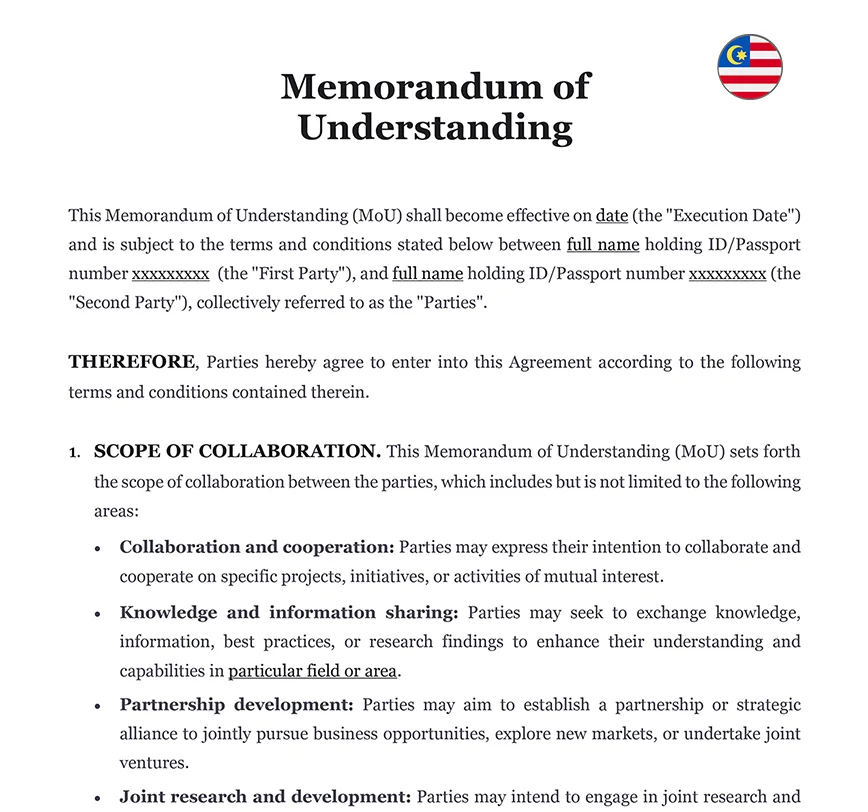Ready to use legal template
Drafted by experienced lawyers
Compliant with Hong Kong law
Ready to use legal template
Drafted by lawyers
Compliant with Hong Kong law
Home › Business contracts › Memorandum of Understanding
Learn more about Memorandum of Understanding in Hong Kong
A memorandum of understanding (MOU) is a written agreement that outlines the key terms and intentions between two or more parties before entering into a formal contract. While generally not legally binding, an MOU serves as a crucial document to clarify expectations, define responsibilities, and establish the framework for future negotiations. In Hong Kong, MOUs are widely used in business partnerships, joint ventures, and commercial transactions to ensure all parties are aligned before committing to legally enforceable terms. A well-drafted MOU minimizes misunderstandings and helps streamline the contract drafting process. At Themis Partner, we offer a professionally drafted memorandum of understanding template, tailored for Hong Kong’s legal and business environment. Our easy-to-edit Word format allows for quick customization to suit your specific needs. Download your MOU today and set a strong foundation for your business agreements.
Table of contents
-
What is a memorandum of understanding (MOU) in Hong Kong?
-
What is included in this memorandum of understanding?
-
Is a memorandum of understanding legally binding in Hong Kong?
-
What is the difference between a MOU and a contract?
-
When should businesses use a memorandum of understanding?
-
How long is a memorandum of understanding valid in Hong Kong?
-
What happens if one party breaches an MOU in Hong Kong?
-
Can a memorandum of understanding be terminated?
-
Can a MOU be used for international agreements?
What is a memorandum of understanding (MOU) in Hong Kong?
A Memorandum of Understanding in Hong Kong is a formal document outlining the basic terms and intent of collaboration between two or more parties. It is typically used in the early stages of negotiation to express mutual interest in pursuing a business, educational, or governmental initiative.
MOUs are popular in Hong Kong’s corporate landscape for joint ventures, cross-border partnerships, research collaborations, and government-led development programs. They help formalize discussions without creating immediate legal obligations. Hong Kong’s legal system acknowledges the difference between intention and obligation more on this is explained by the Department of Justice regarding general contract law principles.
ℹ️ If you’re forming a long-term alliance, download your Partnership Agreement to secure roles, obligations, and equity structure for your collaboration.
What is included in this memorandum of understanding?
A well-drafted MOU Hong Kong should contain the following:
| ➤ Scope of Collaboration: Defines areas such as business alliances, research, training, or sustainability projects. |
| ➤ Roles and Responsibilities: Details what each party agrees to do, such as funding, facilities, staffing, or joint oversight. |
| ➤ Duration: Specifies the term (one year) and renewal options. |
| ➤ Communication and Reporting: Sets protocols for meetings, updates, and reporting obligations. |
| ➤ Confidentiality: Protects exchanged information, with exceptions for legal disclosures. |
| ➤ Intellectual Property: Clarifies IP ownership and licensing, which must comply with the Intellectual Property Department of Hong Kong. |
| ➤ Financial Matters: Covers funding, payment terms, and budget processes. |
| ➤ Dispute Resolution: Mandates negotiations, then mediation or arbitration under HKIAC rules. |
| ➤ Termination: Outlines conditions for ending the MOU with a 30-day notice period. |




